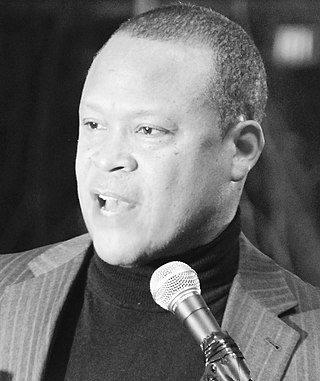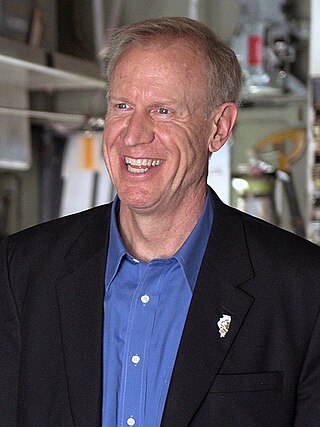Collective bargaining is a process of negotiation between employers and a group of employees aimed at agreements to regulate working salaries, working conditions, benefits, and other aspects of workers' compensation and rights for workers. The interests of the employees are commonly presented by representatives of a trade union to which the employees belong. A collective agreement reached by these negotiations functions as a labour contract between an employer and one or more unions, and typically establishes terms regarding wage scales, working hours, training, health and safety, overtime, grievance mechanisms, and rights to participate in workplace or company affairs. Such agreements can also include 'productivity bargaining' in which workers agree to changes to working practices in return for higher pay or greater job security.
In the context of labor law in the United States, the term right-to-work laws refers to state laws that prohibit union security agreements between employers and labor unions. Such agreements can be incorporated into union contracts to require employees who are not union members to contribute to the costs of union representation. Unlike the right to work definition as a human right in international law, U.S. right-to-work laws do not aim to provide a general guarantee of employment to people seeking work but rather guarantee an employee's right to refrain from being a member of a labor union.
A union security agreement is a contractual agreement, usually part of a union collective bargaining agreement, in which an employer and a trade or labor union agree on the extent to which the union may compel employees to join the union, and/or whether the employer will collect dues, fees, and assessments on behalf of the union.
An open shop is a place of employment at which one is not required to join or financially support a union as a condition of hiring or continued employment.

Kenneth Dunkin is an American politician. Dunkin previously served as a Democratic member of the Illinois House of Representatives, representing the 5th District from December 2002 until January 2017 and as an appointed by Governor Bruce Rauner to fill a vacancy on the Board of Commissioners for the Metropolitan Water Reclamation District of Greater Chicago in May 2018, serving until December of that same year.

District Council 37 is New York City's largest public sector employee union, representing over 150,000 members.

The American Federation of State, County and Municipal Employees (AFSCME) is the largest trade union of public employees in the United States. It represents 1.3 million public sector employees and retirees, including health care workers, corrections officers, sanitation workers, police officers, firefighters, and childcare providers. Founded in Madison, Wisconsin, in 1932, AFSCME is part of the AFL–CIO, one of the two main labor federations in the United States. AFSCME has had four presidents since its founding.
The Graduate Employees' Organization at UIUC (GEO) is a labor union created to defend and extend the bargaining and employment rights of Graduate Employees at the University of Illinois Urbana-Champaign (UIUC).
The State, County, and Municipal Workers of America (SCMWA) was an American labor union representing state, county, and local government employees. It was created by the Congress of Industrial Organizations (CIO) in 1937 along with United Federal Workers of America. SCMWA's leaders Abram Flaxer and Henry Wenning had been leaders of the Association of Workers of Public Relief Agencies (AWPRA) in New York City prior to the formation of SCMWA.

The 2011 Wisconsin protests were a series of demonstrations in the state of Wisconsin in the United States beginning in February involving as many as 100,000 protesters opposing the 2011 Wisconsin Act 10, also called the "Wisconsin Budget Repair bill." The protests centered on the Wisconsin State Capitol in Madison, with satellite protests also occurring at other municipalities throughout the state. Demonstrations took place at various college campuses, including the University of Wisconsin–Madison and the University of Wisconsin–Milwaukee. After the collective bargaining bill was upheld by the Wisconsin Supreme Court on June 14, the number of protesters declined to about 1,000 within a couple days.

2011 Wisconsin Act 10, also known as the Wisconsin Budget Repair Bill or the Wisconsin Budget Adjustment Act, is a controversial law enacted by the 100th Wisconsin Legislature which significantly limited the rights and compensation of state and local government employees in Wisconsin. It was the signature act of Republican governor Scott Walker, who described it as a tool needed to address a projected $3.6 billion budget deficit. The introduction of this bill provoked immediate outrage from labor unions and their allies, and resulted in months of mass protests at the Wisconsin State Capitol. Democratic members of the Wisconsin Senate then fled the state to deny a quorum for the bill, remaining in Illinois for three weeks. Republicans in the legislature eventually stripped out budgetary items to circumvent budget-related quorum rules and passed the legislation on March 9, 2011. The law was signed by governor Walker on the morning of March 11 and was followed by a ceremonial signing later that day.
Abood v. Detroit Board of Education, 431 U.S. 209 (1977), was a US labor law case where the United States Supreme Court upheld the maintaining of a union shop in a public workplace. Public school teachers in Detroit had sought to overturn the requirement that they pay fees equivalent to union dues on the grounds that they opposed public sector collective bargaining and objected to the political activities of the union. In a unanimous decision, the Court affirmed that the union shop, legal in the private sector, is also legal in the public sector. They found that non-members may be assessed agency fees to recover the costs of "collective bargaining, contract administration, and grievance adjustment purposes" while insisting that objectors to union membership or policy may not have their dues used for other ideological or political purposes.

The 2014 Illinois gubernatorial election was held on November 4, 2014, to elect the governor and lieutenant governor of Illinois, concurrently with the election to Illinois's Class II U.S. Senate seat, as well as other elections to the United States Senate in other states and elections to the United States House of Representatives and various state and local elections.

Bruce Vincent Rauner is an American businessman, philanthropist, and politician who served as the 42nd governor of Illinois from 2015 to 2019. A member of the Republican Party, he was the chairman of R8 Capital Partners and chairman of the Chicago-based private equity firm GTCR.

Jeanne M. Ives is an American politician. A Republican, she is a former member of the Illinois House of Representatives for the 42nd district. She was a candidate for governor of Illinois and U.S. representative for Illinois's 6th congressional district.
Harris v. Quinn, 573 U.S. 616 (2014), is a US labor law case of the United States Supreme Court regarding provisions of Illinois state law that allowed a union security agreement. Since the Taft-Hartley Act of 1947 prohibited the closed shop, states could still choose whether to allow unions to collect fees from non-union members since the collective agreements with the employer would still benefit non-union members. The Court decided 5–4 that Illinois's Public Labor Relations Act, which permitted the union security agreements, violated the First Amendment. A similar case was decided by the Court in 2018, Janus v AFSCME, overturning the Court's unanimous decision in Abood v. Detroit Board of Education (1977) which the appeals court had upheld in Harris.
Friedrichs v. California Teachers Association, 578 U.S. ___ (2016), is a United States labor law case that came before the Supreme Court of the United States. At issue in the case was whether Abood v. Detroit Board of Education (1977) should be overruled, with public-sector "agency shop" arrangements invalidated under the First Amendment, and whether it violates the First Amendment to require that public employees affirmatively object to subsidizing nonchargeable speech by public-sector unions, rather than requiring employees to consent affirmatively to subsidizing such speech. Specifically, the case concerned public sector collective bargaining by the California Teachers Association, an affiliate of the National Education Association.

Juliana Stratton is an American lawyer and politician serving as the 48th lieutenant governor of Illinois since 2019. She previously served as a Democratic member of the Illinois House of Representatives from 2017 to 2019. She is the first African-American woman to become Illinois' lieutenant governor, and the state's fourth woman lieutenant governor overall, after Corinne Wood, Sheila Simon, and Evelyn Sanguinetti.
Janus v. American Federation of State, County, and Municipal Employees, Council 31, No. 16-1466, 585 U.S. ___ (2018), abbreviated Janus v. AFSCME, is a landmark decision of the US Supreme Court on US labor law, concerning the power of labor unions to collect fees from non-union members. Under the Taft–Hartley Act of 1947, which applies to the private sector, union security agreements can be allowed by state law. The Supreme Court ruled that such union fees in the public sector violate the First Amendment right to free speech, overruling the 1977 decision in Abood v. Detroit Board of Education that had previously allowed such fees.
The Illinois pension crisis refers to the rising gap between the pension benefits owed to eligible state employees and the amount of funding set aside by the state to make these future pension payments. As of 2020, the size of Illinois' pension obligation is $237B, but the state's pension funds have only $96B available for payouts to retirees.









